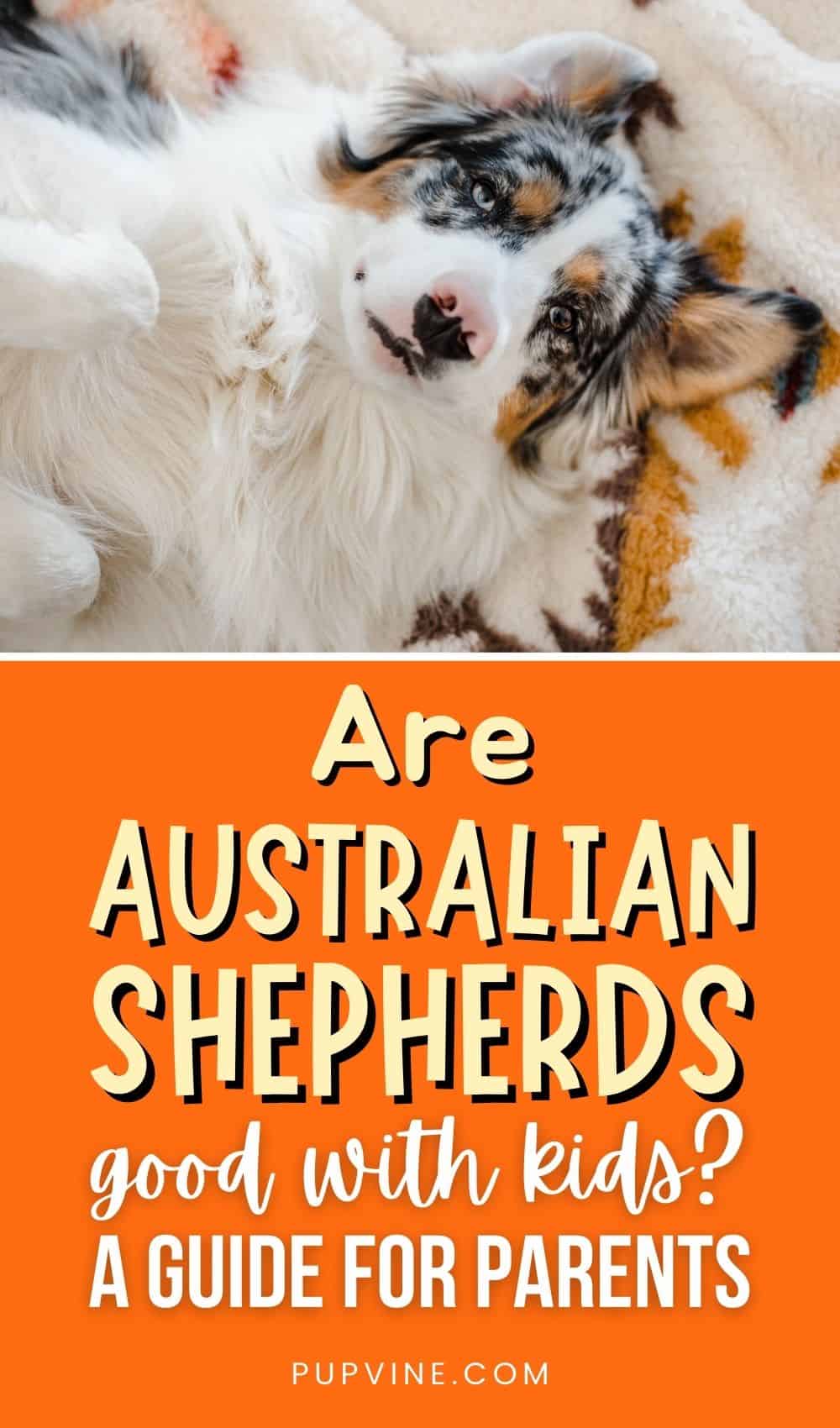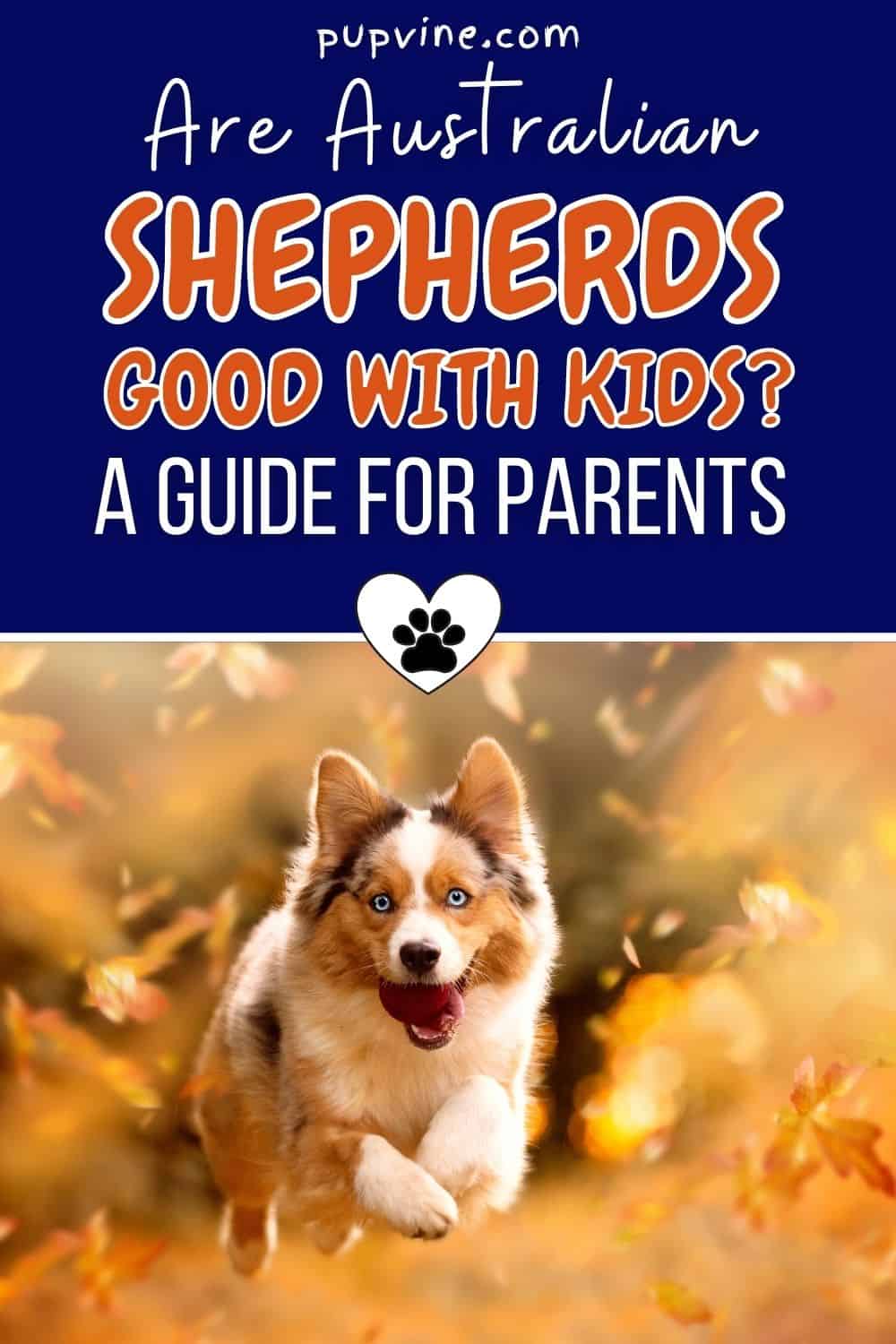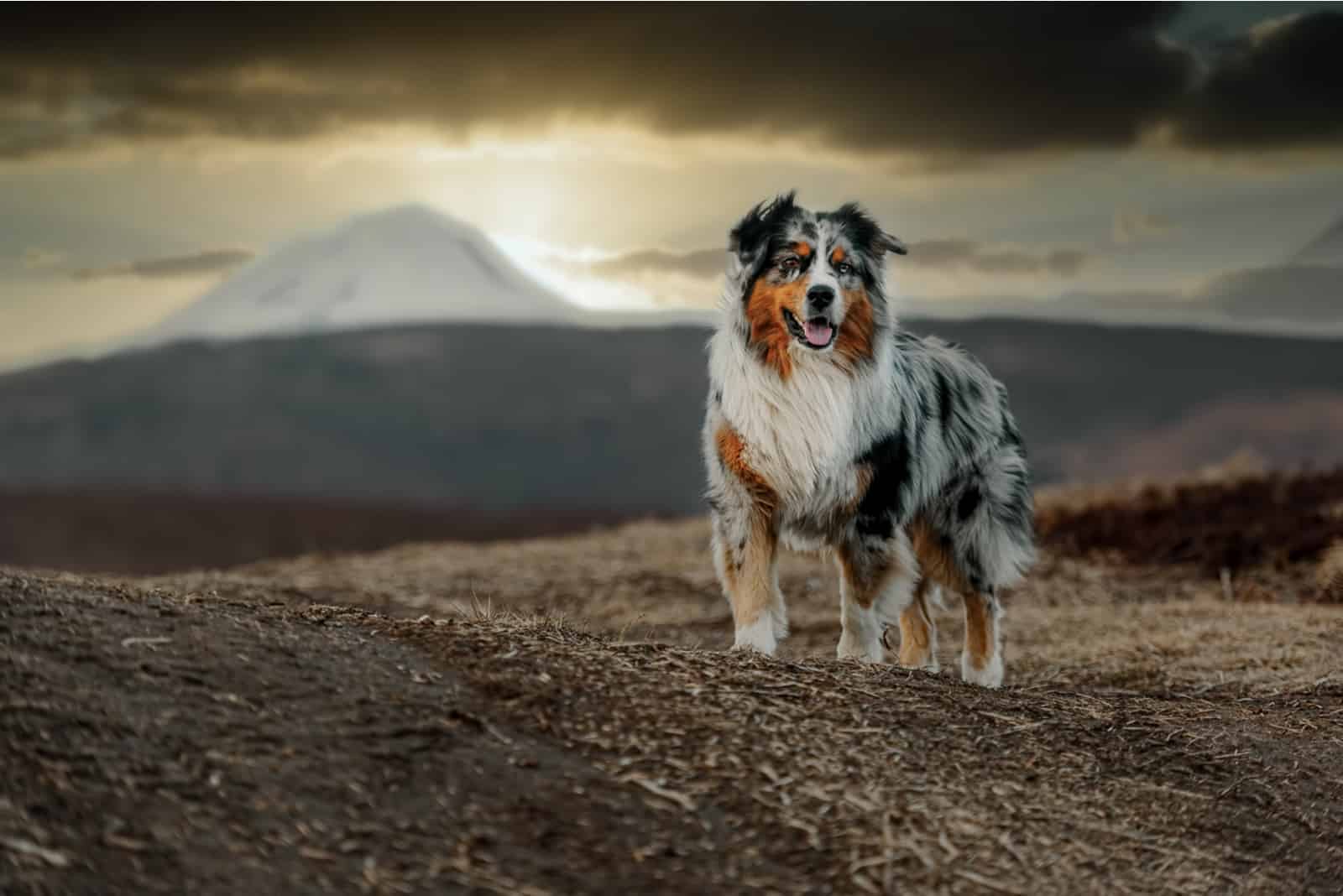To give an honest answer right from the start, opinions are divided on the subject. However, what we can do is explore why this is and help you to draw your own conclusions.
As a parent, it is natural that you want the best for your children. You want them to be safe, of course. You never want to willingly put them at risk. So when you’re choosing a family dog, you do some research to discover if a particular dog breed might possess characteristics that make them unsuitable.
Some breeds have a reputation for being aggressive or dangerous, which in some senses is unfair as humans must take a large share of the blame for this.
In this modern age, where news can travel around the world in seconds, stories and video clips of aggressive dogs can be shared in an instant. These dramatic scenes resonate with people, causing them to form negative associations that are hard to shift.
It could be that some of these stories about Australian Shepherd dogs with behavioral problems have sowed the seeds of doubt. But is it a true reflection of their character?
Are Aussie Shepherds Aggressive?
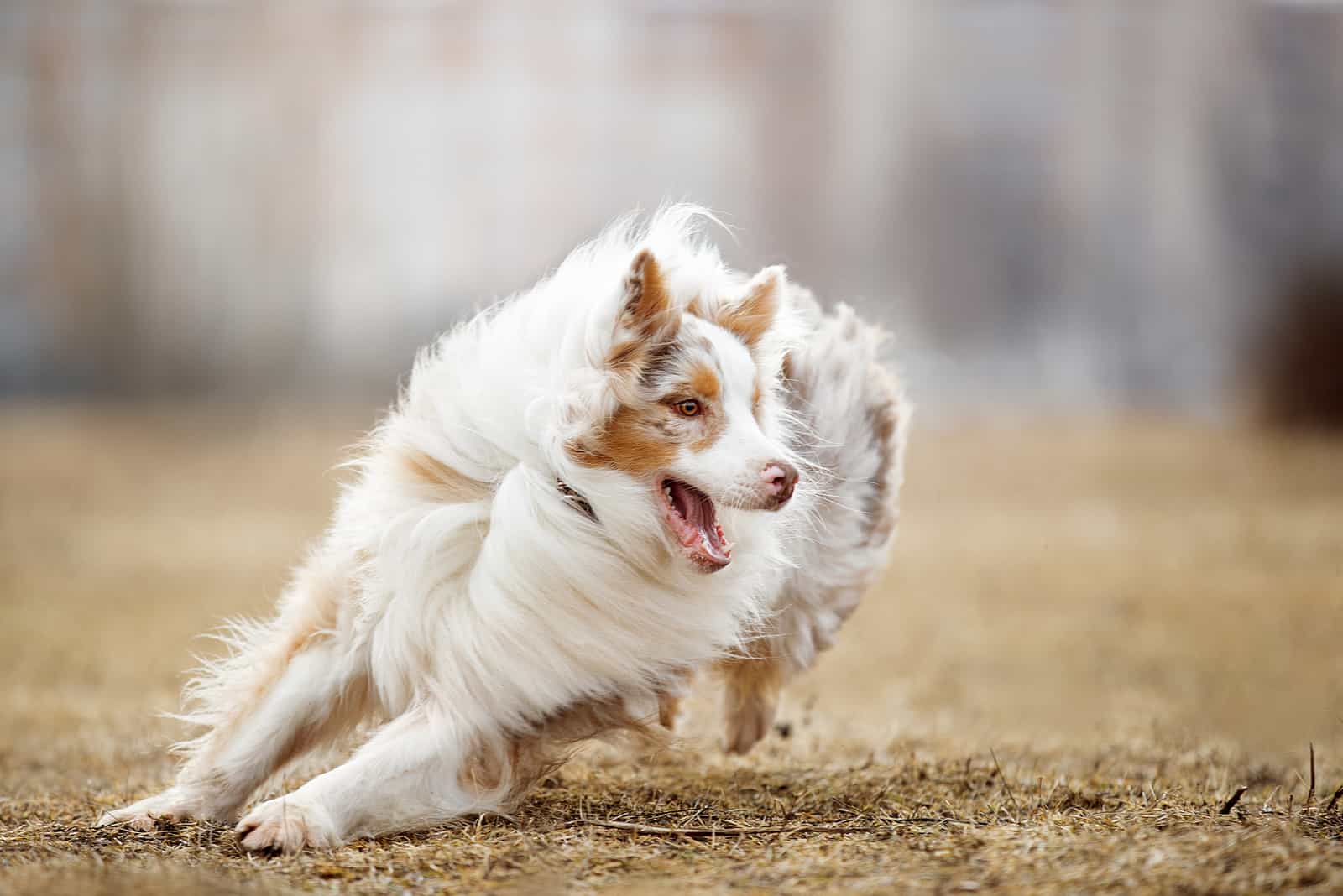
This is the key issue to tackle if we want to answer our main question, are Australian Shepherds good with kids? For the most part, it seems that Aussie Shepherds are not considered an aggressive breed!
So why are there so many conflicting opinions? Probably because of the reasons mentioned above, as well as the fact that they can sometimes appear a little intimidating. Some have light-colored, piercing eyes that are always alert. These are highly intelligent dogs, too, with an independent streak that needs a firm hand. But does this mean they are aggressive?
First, we need to determine what aggressive behavior is, then we must understand why it is happening. It’s also important to remember that although dog breeds can possess general characteristics, each individual dog will have its own personality and character traits.
Unlike us, dogs can’t communicate their feelings by any other means than through their bodies.
If something upsets them, they might howl, bark, snarl, growl, snap or bite. What we might see as aggression might simply be their way of telling us that they are not happy. There’s a huge difference between a warning growl and a full-on attack that results in serious injury.
As soon as pups are able to, they’ll be romping with their siblings. This will involve ‘mouthing’ and nipping, which forms part of the process of learning essential skills. They’ll push boundaries, sometimes going too far, at which point their sibling will retaliate. This is all normal behavior and isn’t considered to be aggressive.
When a pup is taken from the litter and becomes a family pet, young children will naturally become playmates, and the dog will expect them to behave the same way his siblings did. This might lead to instances where the puppy goes a bit too far. The best way to deal with this is through training, as well as making sure that young kids know how to act around dogs.
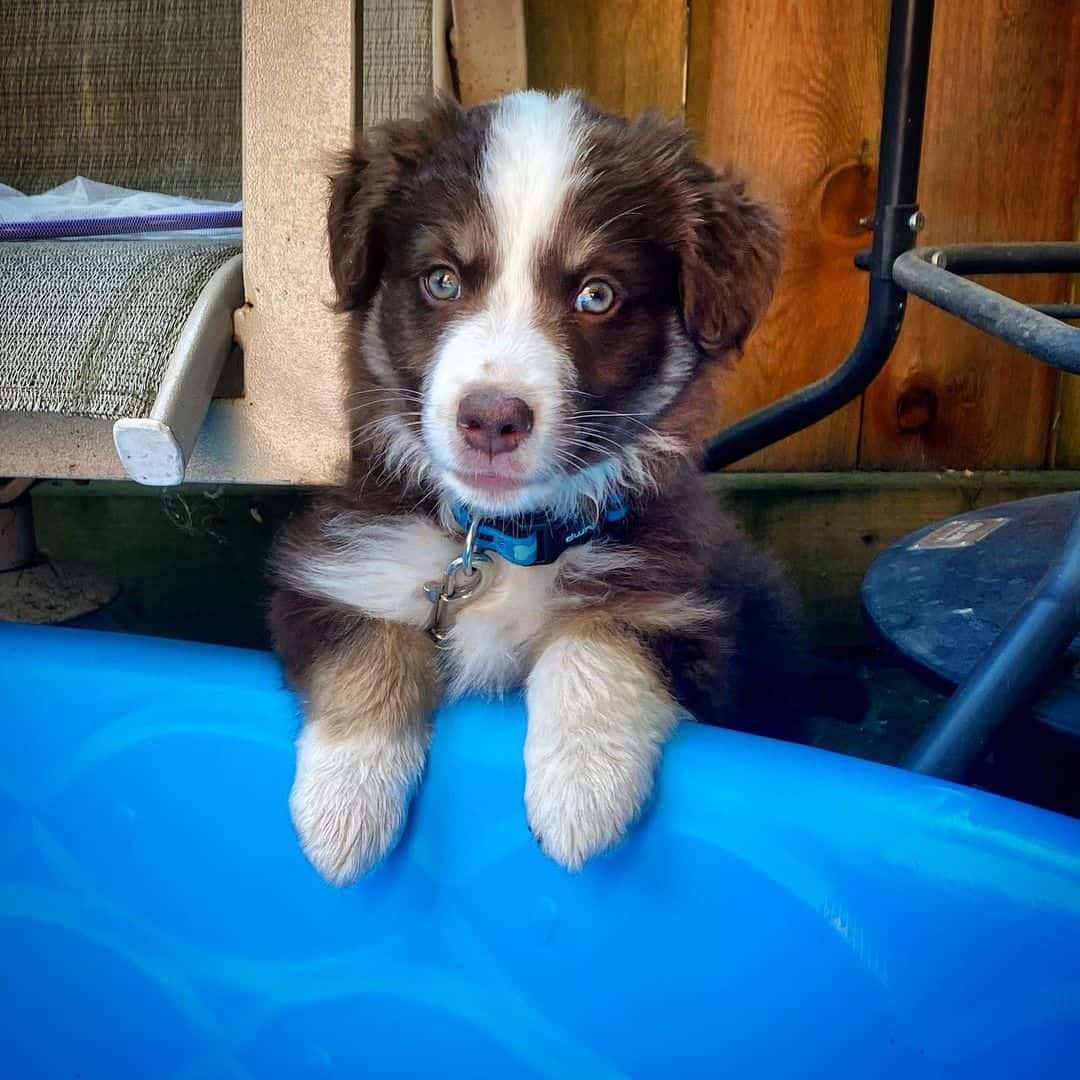
Photo from @aussieboyluke
The Australian Shepherd is classed by organizations such as the American Kennel Club ( AKC ) as a herding dog. As such, they retain an instinct to nip, just as they would have done on the ranches and farms of Australia. Ankle nipping can be a nuisance, especially when the herding instinct takes over and the dog starts rounding up your young kids! While doing this, instead of (or as well as) nipping, they may bump into children as part of the herding process. Again, this can be controlled through early training.
Aside from these behaviors, Aussie Shepherds might display aggression because of fear, anxiety, or pain. It has to be said that any dog might react the same way!
Finally, studies have shown that this shepherd dog breed forms a strong bond with family members. Because of this, they may be very protective, showing aggression towards strangers or unfamiliar dogs, or even other dogs in the home.
Once you’ve ruled out sickness or pain as a cause of aggression, you need to consider whether the dog is anxious or fearful. And if you cross these off the list, then firm training and positive reinforcement are the best way forward.
On the whole, this breed is not considered to be aggressive, especially not towards their owner.
Where Did They Come From?
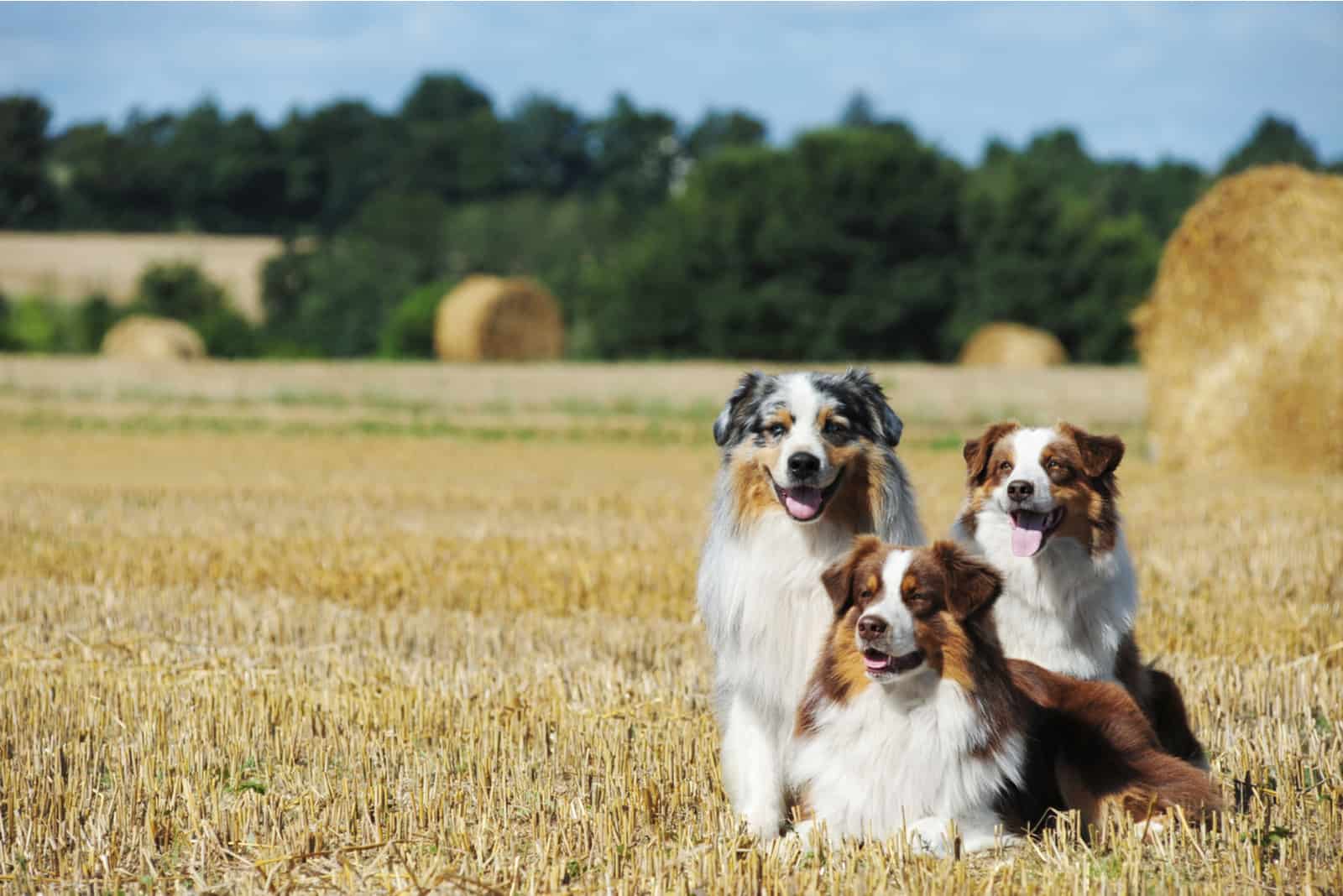
Some say that these beautiful sheepdogs originated in the Basque region of Spain and that the Basque shepherds who used them took them to America via Australia in the 1800s. Others believe that the breed was fully developed on the ranches of the American West. Whatever the truth, the name has become firmly established, and the Aussie has enjoyed an increase in popularity in recent years.
Are Australian Shepherds Good Family Pets?
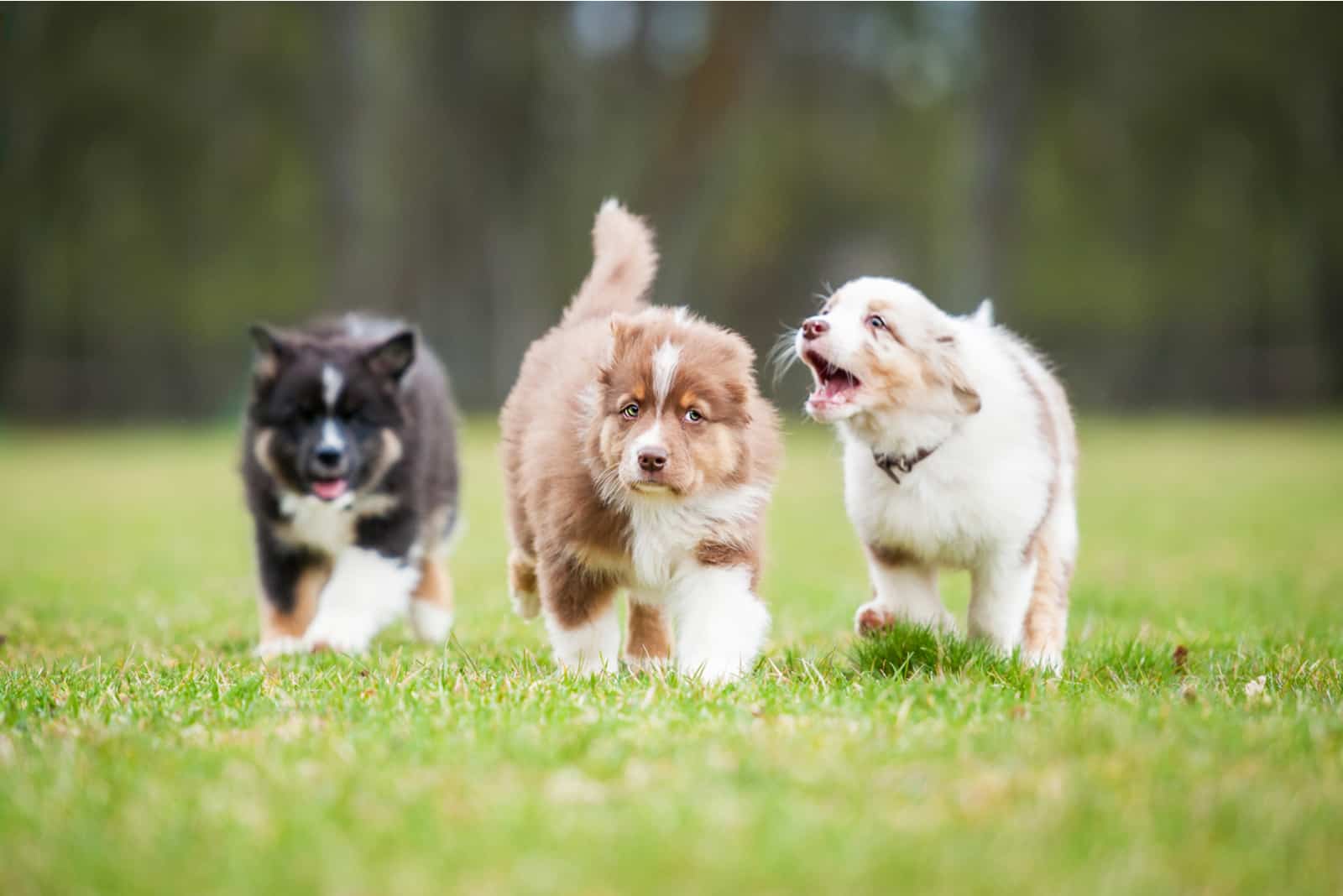
This is basically another way of asking, are Australian Shepherds good with kids? But it allows us to expand on the subject! We’ll start by saying that, yes, they are great dogs for families.
However, it all depends on the family.
One of the great things about humans is that we’re all so different. We have varying likes and dislikes, hobbies, pastimes, leisure pursuits, activity levels, and so on. Some families are very active and love to hike, cycle, swim, climb, etc. Others prefer to relax in the garden and read a book or settle on the sofa to watch a movie. When you get a dog, it’s important to find one that suits your lifestyle.
Australian Shepherd dogs are very energetic and highly intelligent. They need between forty minutes and two hours of exercise every day, and they require mental stimulation to stop them from getting bored. They don’t like to be left alone for long periods and might become destructive.
Active dogs need an active family, so your Australian Shepherd puppy will be only too happy to head out for a game of frisbee, chasing a ball, or a good long walk a couple of times a day. Ideally, you’ll have a large yard for the dog to zoom around. Having said this, they are also known to be very easy-going!
Care and grooming are a vital part of owning a dog, and it is something that children should be encouraged to take part in. The Aussie Shepherd needs brushing at least once a week to keep its coat healthy and free from tangles. This removes dead hair and skin from their double-coat and distributes natural oils that keep the coat silky.
Even after all this, they are moderate shedders, and you’ll struggle to keep your home free from the hair that will stick to furniture, clothes, and carpets throughout your home.
A good bath with a high-quality dog shampoo is recommended every 4 to 6 months, though you might need to have an extra bathing/grooming session if your pooch comes home covered in mud, leaves, and twigs.
So, if you are an active family that can match your Aussie ‘s energy level, and can commit to giving them the care, exercise, and attention they need, then this breed will make a good family pet.
What Do They Look Like?
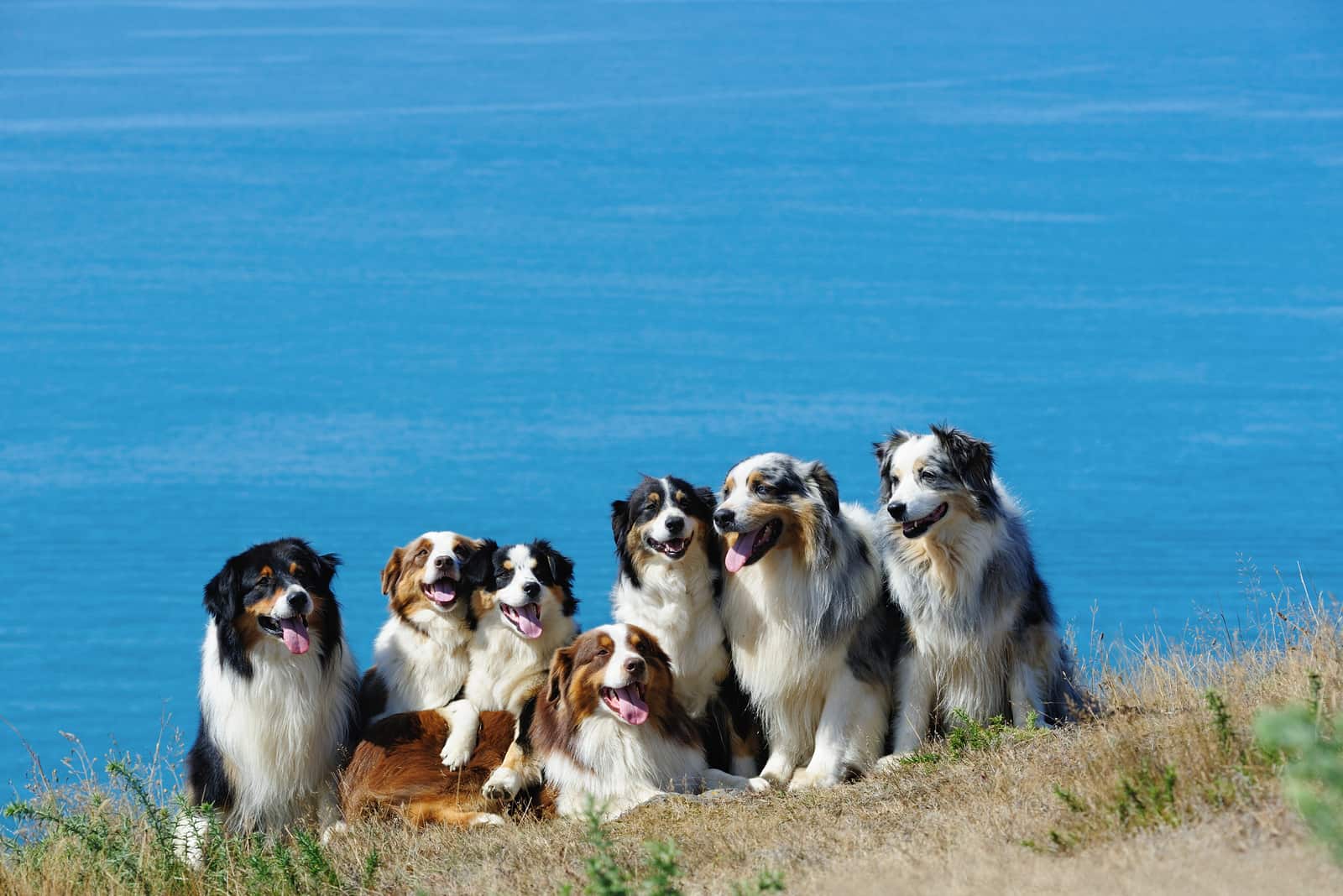
There’s a touch of Collie and Border Collie about them, with a fascinating variety of coat colors: blue merle, red merle, black, and red, all with or without black and tan.
Males stand about 56 cm (22 in) at the withers, and females are around 50 cm (20 in). Males, as usual, are heavier, being between 23–29 kg (50–65 lbs), and females between 18–25 kg (40–55 lbs).
They have a straight, medium length coat that protects them from the heat in summer and the cold during the winter months.
Their eye colors can be astonishing! They can have blue, hazel, amber, brown, or green eyes, or even a combination of two colors! These are striking in appearance, highlighting their alert nature.
Are There Any Negative Points?
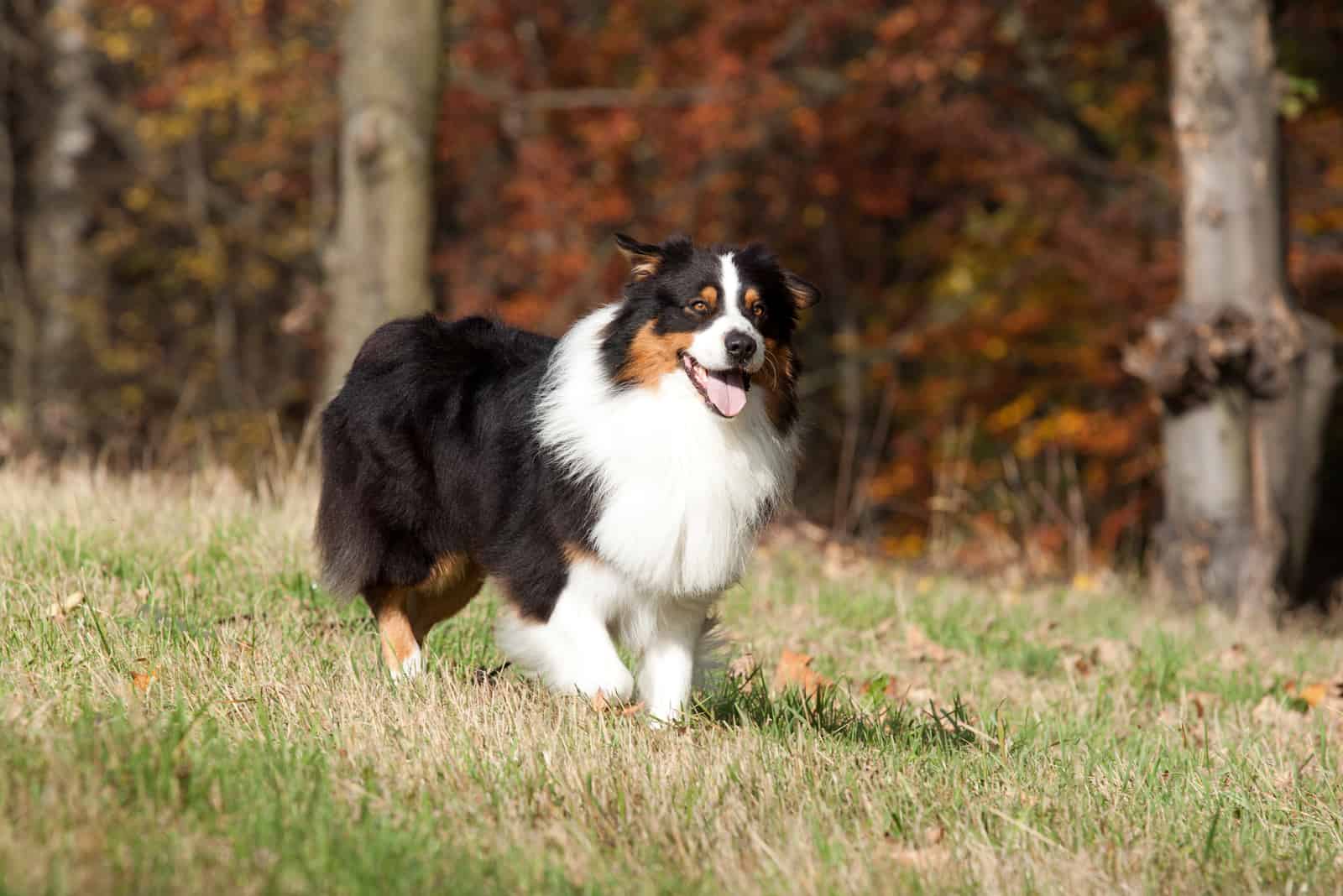
We’ve looked at possible reasons for aggressive behavior and seen some of the solutions. However, other issues need to be looked at in the interests of balance:
A Dominant Personality
They were originally bred as working dogs, with high energy levels that allowed them to roam and run over large areas of land as they herded flocks of sheep. They love to be in control and to dominate, just as they would have dominated the flocks, and if you’re not careful, they will dominate you!
It is important to establish firm boundaries, with you, the dog owner, as the alpha. If you don’t do this, they will continually push against you to show you that they are the boss. As usual, the best way to solve this problem is through training. Because of their intelligence, they are very quick learners and will respond well to reward-based training.
Protectiveness
We touched on aggressive behavior earlier, but it’s worth mentioning again. Even though this cattle dog breed is regarded as non-aggressive, these dogs can react badly to strangers and other dogs. This is because of that strong bond they form with their family. They feel very protective and are only trying to keep you safe!
Socialization is essential, should be started as early as possible, and should ideally be ongoing. This helps them get used to dealing with other dogs and people, which should go a long way to resolving this issue.
Velcro Dogs
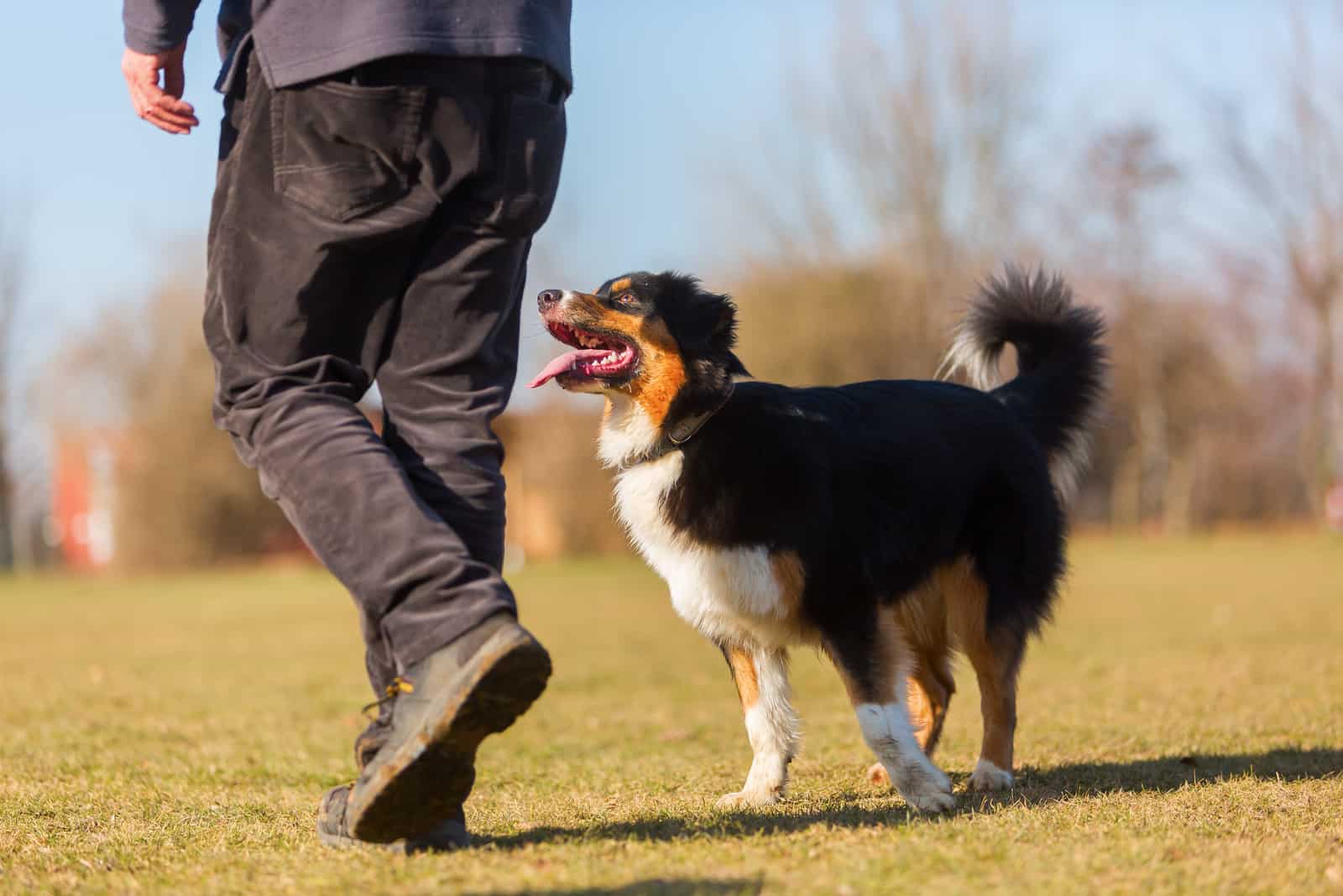
Another potential problem stems from the nickname velcro dog, as they can be seriously clingy. They form such a strong attachment with you that they stick close by, often getting underfoot. They’ve been known to brush by people going up or down stairs, close enough to send a young child or elderly adult tumbling down. Dogs are famous for being our best friend, but this breed takes it to extremes!
Energy + Intelligence
Let’s talk about that high energy and intelligence again, as the two can be a problem when combined. It isn’t just that they love being physically active, rather that they need it. And when they don’t get enough exercise, you’ll see a marked change in their demeanor and behavior. Aussies are often selected as police dogs, for search and rescue work, and as service dogs for people with physical impairments.
This highlights their love of being occupied with mental and physical challenges. If you get one, you must be certain that you can fulfill this need. Not doing so would be cruel and could lead to a very frustrated dog who will be bad-tempered and destructive.
Health Problems
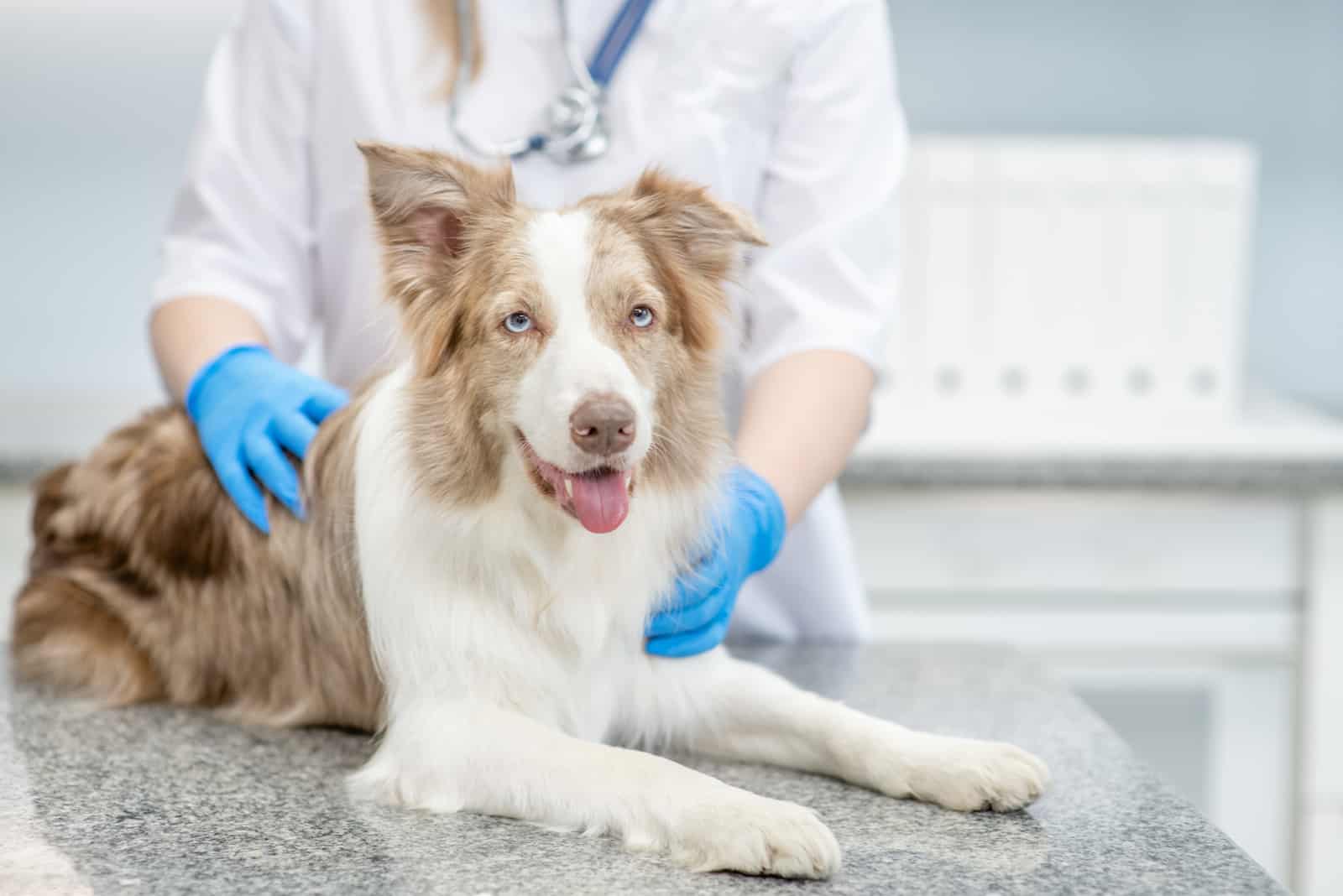
All dogs have health issues, so let’s take a look at what common conditions affect the Aussie:
• Hip dysplasia – a condition where the ball and socket are malformed, resulting in arthritis. Surgery is the usual treatment for this condition, followed by drugs for the pain.
• Elbow dysplasia – similar to the hip problem but involves a more complex joint, causing lameness and arthritis.
• Epilepsy – an inherited condition that causes seizures from the age of six months to three years. This can usually be controlled with medication.
• Vitamin B12 malabsorption – a genetic condition that stops the body from absorbing B12, leading to weakness, a lack of growth, and blood disorders.
• Eye conditions – including cataracts and progressive retinal atrophy, which can lead to blindness.
• Drug sensitivity – an inherited condition that renders them very sensitive to certain drugs.
They have a lifespan of between 12 and 14 years, with healthy dogs potentially living longer. If you give them good-quality dog food (for more information on Aussie nutrition, check the Australian Shepherd feeding chart), make sure they have the right amount of exercise, and get them checked out regularly at the vet, then your loyal companion will stick by your side for many years to come.
Is this your first family dog? Then perhaps this isn’t the ideal breed to start with unless you’re willing to commit 100% to the challenges involved. If you like medium to large breeds, you might want to consider something like a Golden Retriever.
The Miniature Australian Shepherd
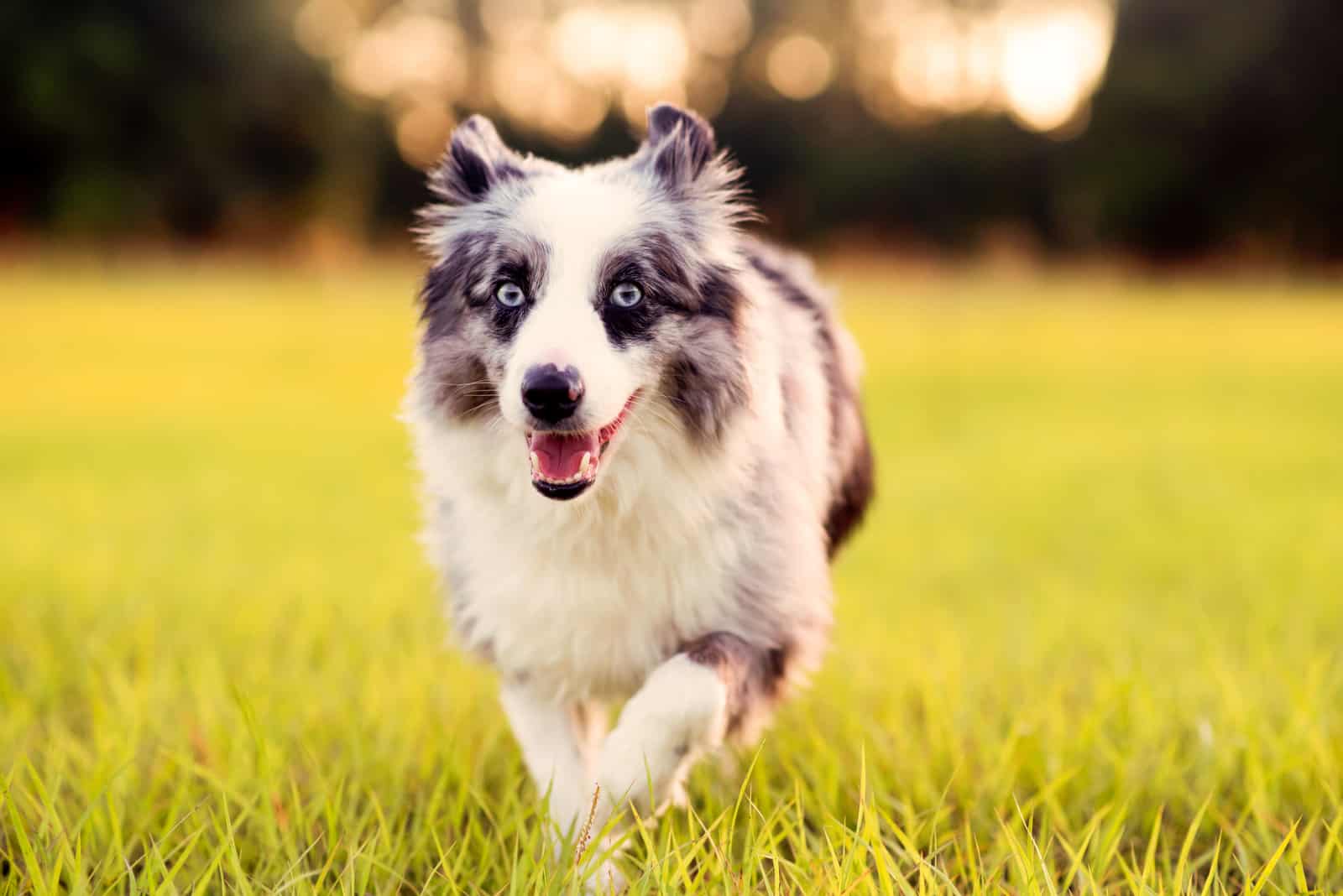
If you like the look of the Aussie but are looking for a smaller dog, this could be the solution! Small dogs take up a lot less room, don’t need as much food or exercise, and will certainly be less intimidating, even though the standard breed isn’t exactly massive.
It has the charm of the larger version all squeezed into a smaller, sweeter package!
Compared to the standard Aussie, they measure between 33–46 cm (13–18 in) at the shoulder and weigh between 9–18 kg (20–40 lbs).
What To Take Away
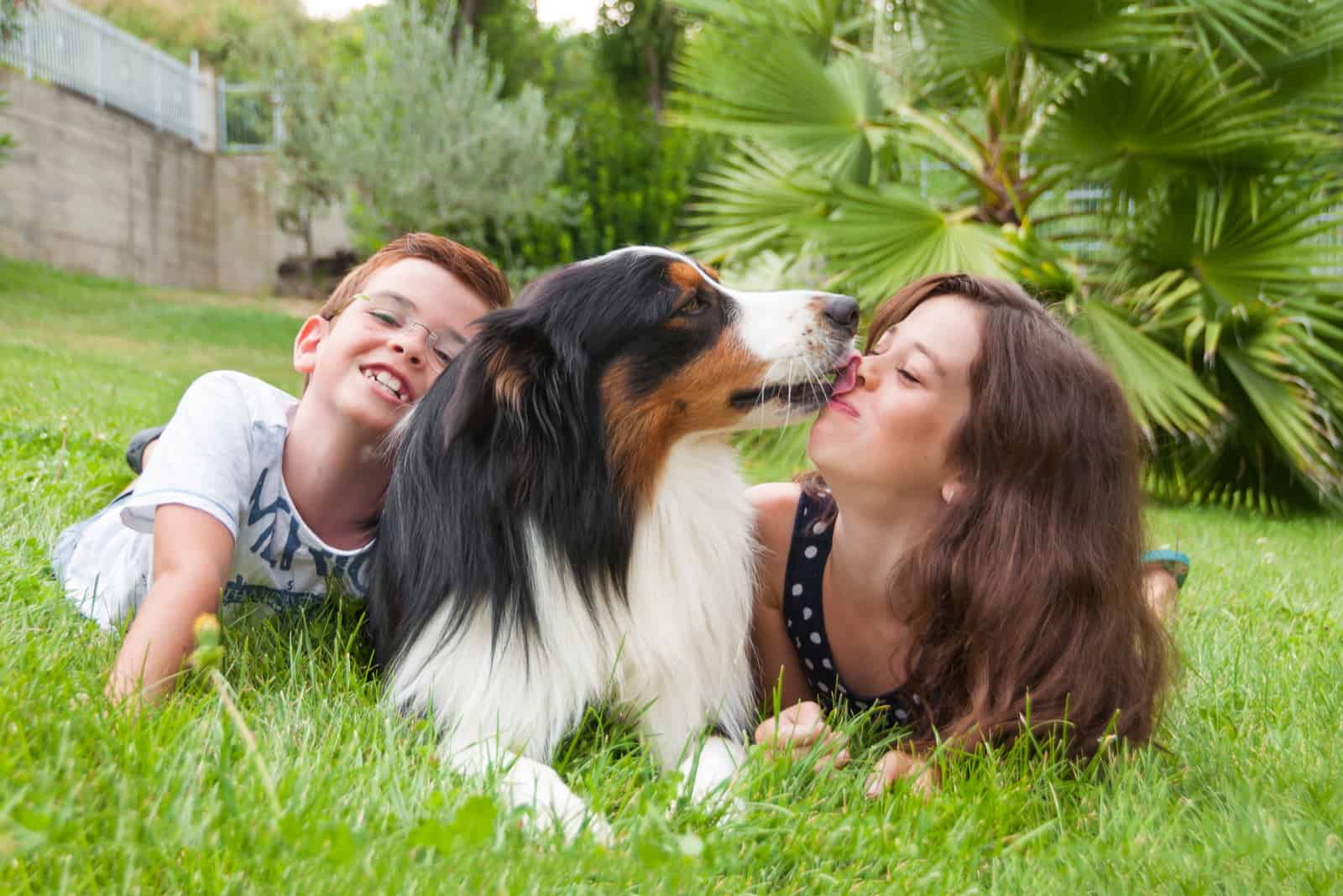
We’ve looked into this fascinating breed in some detail and found the answer to our question, are Australian Shepherds good with kids?
In case you’re in any doubt, let’s spell it out clearly:
The Aussie Shepherd is a loyal, affectionate dog who will adore your kids and relish playtime with them. He will form strong, solid bonds with all family members, especially when dogs and kids are raised together.
They are more suited to the family home than, say, an Australian Cattle dog, but they have their share of challenges and requirements.
Aggression should not be a problem, although they can be very wary of strangers simply because they’re looking out for you. Don’t ever let them have the upper hand, though. You need to be firm and assert your dominance, or they’ll assume the role of pack leader!
Obedience training from an early age is a must. It will solve many potential problems early on, and it is more challenging to train an adult dog as an older dog will have settled into bad habits. The good thing about Aussies is that they are very eager to please and love to learn.
As well as making sure they have plenty of exercise, it’s a good idea to enroll in agility or herding competitions or teach your pup new tricks. Set them puzzles and keep them occupied. It will make them happy and put a stop to boredom and frustration.
If you are prepared to take on all these responsibilities, then the Aussie is one of the best dogs you could ever choose.
Read Next: The Australian Shepherd Tail Mystery — Do They Have A Tail?
